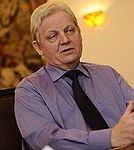2014 Budapest Assembly election
| |||||||||||||||||||||||||||||||||||||||||||||||||||||||||||||
All 33 seats in the General Assembly of Budapest 17 seats needed for a majority | |||||||||||||||||||||||||||||||||||||||||||||||||||||||||||||
|---|---|---|---|---|---|---|---|---|---|---|---|---|---|---|---|---|---|---|---|---|---|---|---|---|---|---|---|---|---|---|---|---|---|---|---|---|---|---|---|---|---|---|---|---|---|---|---|---|---|---|---|---|---|---|---|---|---|---|---|---|---|
| |||||||||||||||||||||||||||||||||||||||||||||||||||||||||||||
 Map showing district mayoral election winners by party colors. White stands for a winning independent candidate. | |||||||||||||||||||||||||||||||||||||||||||||||||||||||||||||
The 2014 Budapest Assembly election was held on 12 October 2014, concurring with other local elections in Hungary. Voters elected the Mayor of Budapest, and the mayors of the 23 districts directly, while 9 seats in the assembly were distributed proportionally, taking into account votes cast for losing district mayoral candidates. This was the first election held under these rules, previously all seats (except for the Mayor) were elected with a party-list method.
Background[edit]
Regarding the Budapest Assembly election, the Fidesz-dominated National Assembly amended the electoral law in June 2014 after an announcement by Fidesz politicians Lajos Kósa and Antal Rogán, half a year before the local elections took place. The amendment, according to analysts, was formed according to the current interests of the ruling party, since it forced cooperation between rival opposition parties (MSZP, DK and Together–PM) in order to win district mayoral positions (and thus Budapest Assembly seats).[1] Only parties with at least 12 mayoral candidates could submit a compensation list. According to the Political Capital analysis think tank, this meant that the three largest opposition parties would have had to give up 7 districts, where all three of them run their own underdog candidate against the plausible Fidesz winner, while while in the remaining 16 districts they cooperate and distribute among themselves in a ratio of 5–5–6. The Political Capital and the opposition parties criticized the Fidesz government, for amending the electoral law according to the current political situation months before the election, thereby reducing legal certainty and violating the ruling party's own adopted Constitution.[2]
The final result of the election (see below) finally justified the criticism. Index.hu calculated that under the old electoral system (party-list proportional rules) the Fidesz would have had only 16 mandates (15 + the mayor) instead of the 20 it won, therefore, the government party majority would not have been behind Mayor István Tarlós that way in the 33-member General Assembly of Budapest.[3]
Mayor[edit]
Incumbent Mayor István Tarlós was reelected with 49.06% of the votes.
District mayors[edit]
| District | Elected mayor | Party | Number of votes for winner |
|---|---|---|---|
| I. | Gábor Tamás Nagy | Fidesz–KDNP | 5 914[4] |
| II. | Zsolt Láng | Fidesz–KDNP | 18 733[5] |
| III. | Balázs Bús | Fidesz–KDNP | 23 615[6] |
| IV. | Zsolt Wintermantel | Fidesz–KDNP | 18 276[7] |
| V. | Péter Szentgyörgyvölgyi | Fidesz–KDNP | 5 621[8] |
| VI. | Zsófia Hassay | Fidesz–KDNP | 5 686[9] |
| VII. | Zsolt Vattamány | Fidesz–KDNP | 7 089[10] |
| VIII. | Máté Kocsis | Fidesz–KDNP | 10 674[11] |
| IX. | János Bácskai | Fidesz–KDNP | 7 954[12] |
| X. | Róbert Kovács | Fidesz–KDNP | 10 585[13] |
| XI. | Tamás Hoffmann | Fidesz–KDNP | 25 777[14] |
| XII. | Zoltán Pokorni | Fidesz–KDNP | 13 893[15] |
| XIII. | József Tóth | MSZP | 28 140[16] |
| XIV. | Gergely Karácsony | Együtt–PM | 18 126[17] |
| XV. | László Hajdu | DK | 11 294[18] |
| XVI. | Péter Kovács | Fidesz–KDNP | 16 064[19] |
| XVII. | Levente Riz | Fidesz–KDNP | 18 887[20] |
| XVIII. | Attila Ughy | Fidesz–KDNP | 15 202[21] |
| XIX. | Péter Gajda | MSZP | 13 858[22] |
| XX. | Ákos Szabados | MSZP–DK–Együtt–PM | 10 564[23] |
| XXI. | Lénárd Borbély | Fidesz–KDNP | 12 158[24] |
| XXII. | Ferenc Karsay | Fidesz–KDNP | 8 964[25] |
| XXIII. | Ferenc Geiger | Independent | 3 061[26] |
Distribution of compensation seats[edit]
Compensation seats were distributed using the D'Hondt method.
| Party | Votes for losing candidates | Additional seats |
|---|---|---|
| MSZP | 66 131 | 3 |
| Fidesz–KDNP | 52 781 | 2 |
| Jobbik | 40 590 | 1 |
| DK | 38 624 | 1 |
| Együtt–PM | 38 380 | 1 |
| LMP | 32 059 | 1 |
Notes[edit]
- ^ Including a joint candidate with other parties, Ákos Szabados (hu)
- ^ After the withdrawal of Ferenc Falus (hu)
References[edit]
- ^ "Megváltozott a választási rendszer Budapesten". Index.hu. 2014-06-10.
- ^ "Ismét nem tudja betartani saját Alaptörvényét a Fidesz". Political Capital. 2014-05-30.
- ^ "Nem lett volna meg Tarlós többsége". Index.hu. 2014-10-28.
- ^ "evkjkv2".
- ^ "evkjkv2".
- ^ "evkjkv2".
- ^ "evkjkv2".
- ^ "evkjkv2".
- ^ "evkjkv2".
- ^ "evkjkv2".
- ^ "evkjkv2".
- ^ "evkjkv2".
- ^ "evkjkv2".
- ^ "evkjkv2".
- ^ "evkjkv2".
- ^ "evkjkv2".
- ^ "evkjkv2".
- ^ "evkjkv2".
- ^ "evkjkv2".
- ^ "evkjkv2".
- ^ "evkjkv2".
- ^ "evkjkv2".
- ^ "evkjkv2".
- ^ "evkjkv2".
- ^ "evkjkv2".
- ^ "evkjkv2".
- ^ "Mered01".






